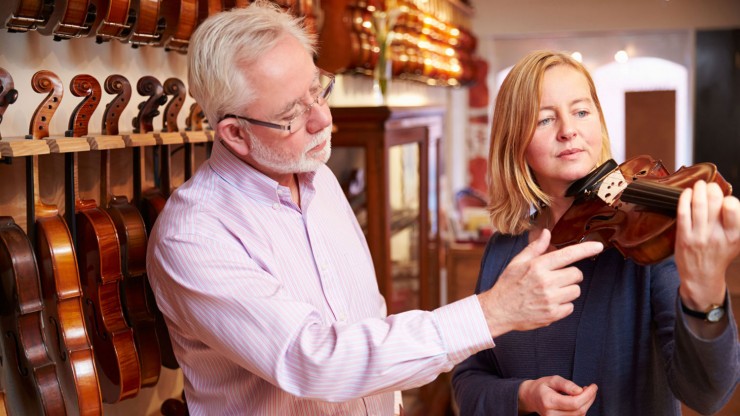When you think of a “typical” music student, you might picture a 7-year-old girl, sitting nervously in front of a piano. Well, if you believe that musical instruments are just for kids, it’s probably time to update your soundtrack.
—
December 20, 2017
There are plenty of reasons people over 50 should consider adding a little music to their lives.
Music is for Your Brain what Circuit Training is for Your Body
As the fitter baby boomers among us know, circuit training involves moving from one exercise machine to another, while giving ourselves a total body workout. There are very few activities that can do the same for your brain – and music is one of them.
According to researchers, most activities use only a few areas of the brain at a time. Playing a musical instrument, on the other hand, sets of a symphony of activity all over your brain.
So, if you are interested in keeping your mind sharp in the decades ahead, you may want to put down the TV remote and pick up a set of drumsticks or a violin bow.
Watch this short TEDvideo for an explanation of exactly how playing a musical instrument affects your brain.
Your Choice of Instrument is a Reflection of Your Personality
Were you forced to play a musical instrument as a child? Many of us are first introduced to playing music when we pick up our first recorder in elementary school. Others are required by, occasionally over-optimistic, parents to learn the piano or violin.
There’s nothing wrong with introducing kids to music. In fact, this is a great idea. At the same time, many of us leave childhood with apathy, if not outright distaste, for playing music. There is something about being forced to do something that steals all of the fun from the activity.
Now that you are in your 50s or 60s, you get to call the shots. Is there an instrument that you have always been fascinated with? Have you, perhaps, ever wanted to play the drums? Or, did you idolize guitar players in your youth? Do you have a secret desire to be a DJ? Now is the time to turn your musical dreams into reality.
Learning an Instrument is a Great Way to Make Friends
Life after 50 can be a challenging time from a social perspective. With their kids out of the house, many baby boomers find themselves lacking the social ties that they had in other stages of their lives. Also, many of us have gone through a divorce or lost a partner.
Learning an instrument can be a fantastic way to get out into the world and meet new people on your terms. In the beginning, your primary interaction may be with your teacher. But, after a while, you will start to meet other musicians who share a passion for your instrument or style of music.
Who knows after several years, you may even decide to join a band or start one of your own.
Music Can Build Your Self-Esteem
Learning an instrument is one of the best ways to build your confidence. For starters, it is something that you can do from the comfort of your home, at least in the beginning. There are tons of online courses that can teach you anything from guitar to electronic music production. Every note you play will ring out as proof that you can do anything that you set your mind to do.
One of the biggest myths about aging is that the older we get, the less able we are to learn new things. What nonsense! This isn’t true at 70, and it indeed isn’t true at 50. So, why not add a little music to your life? Your body, brain, and social life will thank you!
Read the original article at sixtyandme.com
or
For other exciting articles on other note’ worthy benefits of playing a musical instrument go visit musicoomph.com and drumsandguitar.com
—
This article is a re-post, with small modifications, of “4 Powerful Benefits Of Learning A Musical Instrument After 50” an article published on sixtyandme.com by Margaret Manning.
Click here to visit the original content.


